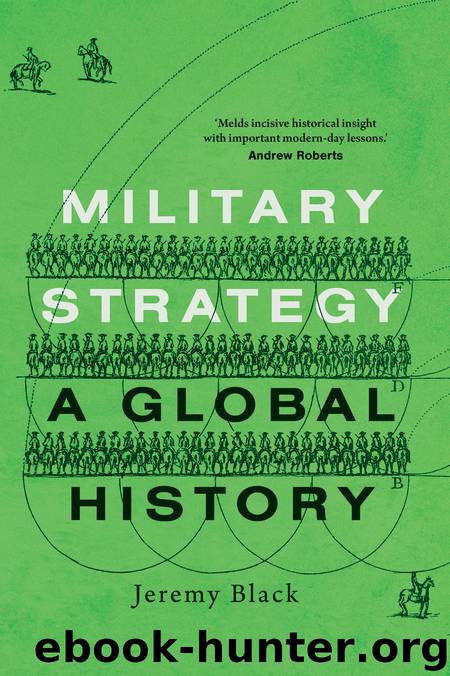Military Strategy by Jeremy Black

Author:Jeremy Black
Language: eng
Format: epub
ISBN: 9780300217186
Publisher: Yale University Press
THE WORLD QUESTION
The strategies by which control over much of the world was contested were those of imperial expansion and naval power. Like those strategies that resulted in the strength and cohesion of the United States, they were more consequential on the world scale than the European-focused strategic agenda linked to Germany and the move towards the First World War, or, indeed, those related to the contesting of control within China from the 1850s to the 1910s. By 1914, the world was largely under the rule or control of European states, or of people of European descent. The world question therefore became that of the competition, eventually conflict, between the leading Western powers. This process was given a new technological context by the transformation offered by telegraphy, railways and steamships, and was given explicit theoretical focus from the late 1890s in the new vocabulary and subject of geopolitics.
This competition between the leading Western powers in part drew on longstanding tensions and particular strategic interests. Thus, although it is possible to depict the Crimean War of 1854–6 as an accident, the British, throughout the nineteenth century, appreciated both that their power depended in no small part on holding India and that the Ottoman (Turkish) Empire protected the lifeline of the British Empire to India. Napoleon’s Egyptian expedition of 1798 remained strong in their memories; although Russia, the Black Sea expansion of which had already given rise to concern in Britain at the time of the Ochakov crisis in 1791, replaced France as the threat. To keep Russia away from the Bosphorus and the Dardanelles was a sound aim from that viewpoint, as were measures to resist Russian influence in Persia (Iran), measures that helped encourage British intervention in the Persian Gulf. So also with the protection of the North-West Frontier of India. To ensure that the frontier region was protected, and that Afghanistan was in friendly hands, were longstanding goals. Despite much recent emphasis on failure, Britain in the ‘Great Game’ secured its strategic goals following both the First (1839–42) and the Second (1878–80) Afghan wars. As a result, Russia felt thwarted in its Afghan strategy.14
The occupation of Egypt in 1882, although provoked by Egyptian bankruptcy and crowds attacking Europeans in Alexandria, was also strategically sound, ensuring British control of the Suez Canal and blocking a possible French takeover of Egypt, which had been a British concern from the 1780s and, even more, the late 1790s. When Robert, 3rd Marquess of Salisbury sent an army against the Mahdists in Sudan in 1895, and then sustained that effort, leading to the victory at Omdurman and the fall of Khartoum in 1898, he did it not to avenge the earlier killing of Major-General Charles George Gordon by the Mahdists in Khartoum in 1885, nor for British national pride, but to prevent French expansion threatening to lead to French control of the Upper Nile, and also a possible alliance between the Mahdists and the Ethiopians, who had just beaten the Italians at Adua in 1896.
Download
This site does not store any files on its server. We only index and link to content provided by other sites. Please contact the content providers to delete copyright contents if any and email us, we'll remove relevant links or contents immediately.
| Arms Control | Diplomacy |
| Security | Trades & Tariffs |
| Treaties | African |
| Asian | Australian & Oceanian |
| Canadian | Caribbean & Latin American |
| European | Middle Eastern |
| Russian & Former Soviet Union |
The Secret History by Donna Tartt(19082)
The Social Justice Warrior Handbook by Lisa De Pasquale(12190)
Thirteen Reasons Why by Jay Asher(8907)
This Is How You Lose Her by Junot Diaz(6885)
Weapons of Math Destruction by Cathy O'Neil(6278)
Zero to One by Peter Thiel(5798)
Beartown by Fredrik Backman(5751)
The Myth of the Strong Leader by Archie Brown(5507)
The Fire Next Time by James Baldwin(5440)
How Democracies Die by Steven Levitsky & Daniel Ziblatt(5218)
Promise Me, Dad by Joe Biden(5153)
Stone's Rules by Roger Stone(5087)
A Higher Loyalty: Truth, Lies, and Leadership by James Comey(4959)
100 Deadly Skills by Clint Emerson(4924)
Rise and Kill First by Ronen Bergman(4785)
Secrecy World by Jake Bernstein(4751)
The David Icke Guide to the Global Conspiracy (and how to end it) by David Icke(4717)
The Farm by Tom Rob Smith(4506)
The Doomsday Machine by Daniel Ellsberg(4489)
